Key takeaways:
- Journaling creates a safe space for self-reflection, helping clarify thoughts and emotions while fostering personal growth.
- It enhances narrative skills by improving the use of sensory details, cultivating creativity, and allowing experimentation with different writing styles.
- Consistent journaling practices, such as setting goals and embracing imperfection, significantly enrich the writing process and personal expression.
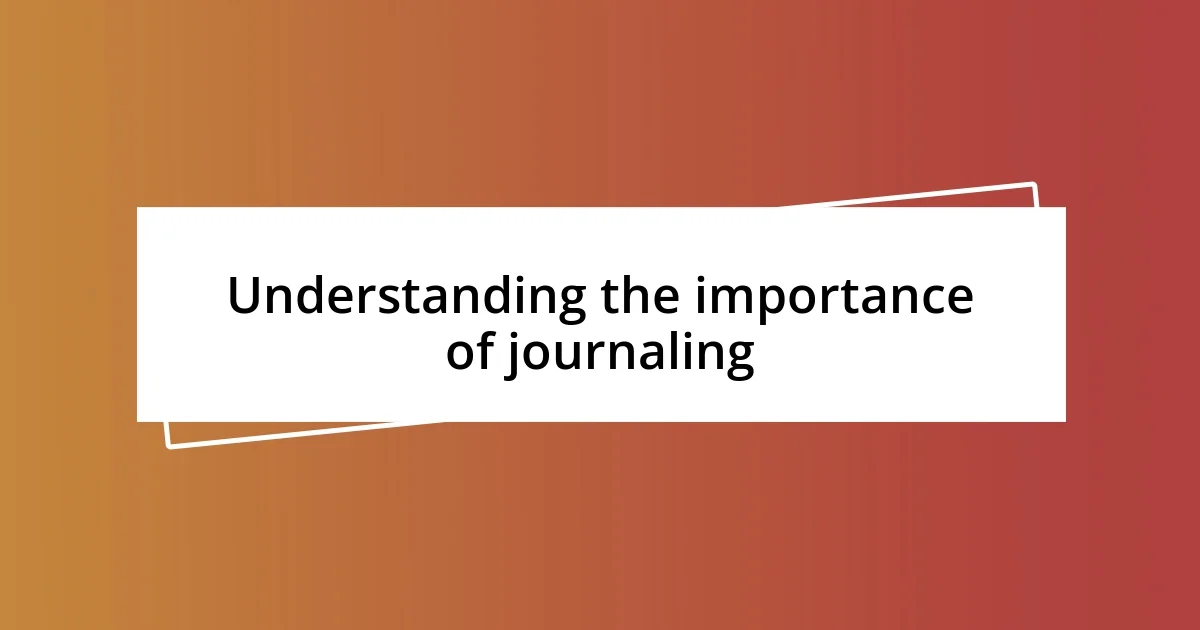
Understanding the importance of journaling
When I first started journaling, I was surprised by how quickly it became a safe space for my thoughts and feelings. There’s something liberating about putting pen to paper – it allows my emotions to flow freely. Have you ever noticed how a simple act, like writing down your worries, can lighten their weight?
Journaling has a remarkable power to clarify my thoughts. Sometimes, I find myself caught in a whirlwind of ideas, and it’s hard to make sense of them. I remember one evening when I poured my heart out about a tough decision. By the end, I not only understood my feelings better, but I also uncovered insights I had previously overlooked. Isn’t it fascinating how our minds work when we give them the freedom to express?
The importance of journaling extends beyond just recording daily events; it fosters self-reflection and growth. I’ve often looked back at old entries and felt a wave of nostalgia mixed with gratitude for how far I’ve come. That moment of realization sparks the question: If we don’t take the time to reflect through journaling, how can we truly appreciate our personal journeys?
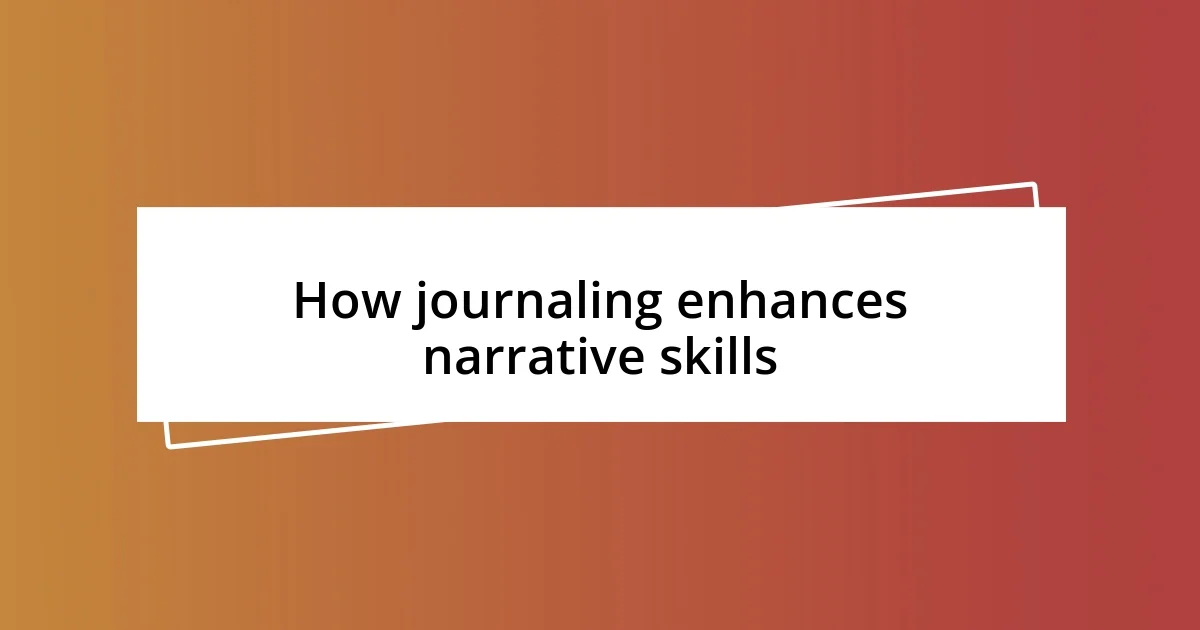
How journaling enhances narrative skills
Journaling has this incredible ability to refine my narrative skills by encouraging me to elaborate on details. I remember a weekend when I decided to write about a memorable trip. As I described the vibrant colors of the sunset and the laughter of friends around me, I realized how important sensory details are in conveying a story. By focusing on these elements, my narrative depth improved, making my writings more immersive and relatable.
Another aspect I’ve noticed is that journaling cultivates creativity. When I sit down to write, I often start with a prompt or a single thought. From there, I allow my ideas to flow freely, like a stream without barriers. This free-writing approach helps me explore plot twists and character development that I might not have initially considered. It enhances my ability to craft compelling narratives with dynamic arcs and engaging characters.
Furthermore, journaling provides a safe environment for experimentation. I recall a period during which I experimented with various narrative styles, from first-person perspectives to third-person omniscient. This trial-and-error journey not only boosted my confidence but also allowed me to understand which techniques resonate with my voice. How often do we get the chance to play with words in such a non-judgmental space? It’s a playground for the mind!
| Journaling Aspect | Impact on Narrative Skills |
|---|---|
| Detail Enhancement | Improves ability to incorporate sensory details, leading to richer stories. |
| Creativity Cultivation | Encourages exploring new ideas and narrative structures, enhancing storytelling depth. |
| Safe Experimentation | Allows for trial-and-error with styles, boosting confidence and developing unique voice. |
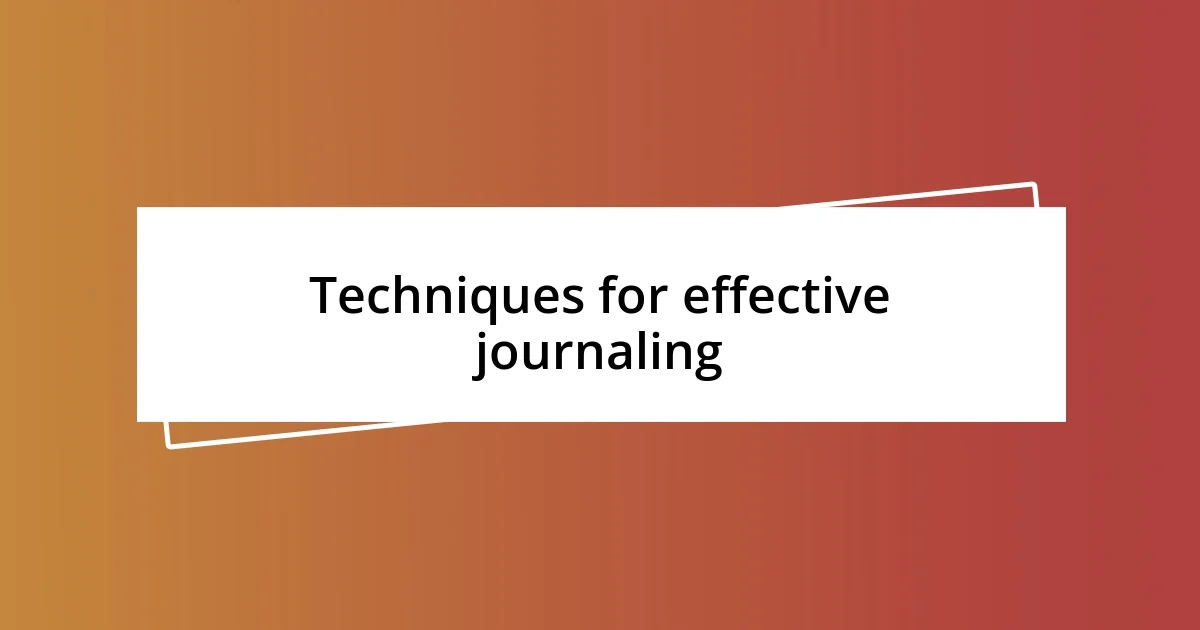
Techniques for effective journaling
One technique that has genuinely transformed my journaling practice is setting specific goals for each session. Rather than just writing whatever comes to mind, I often start with a clear intention, like exploring a specific emotion or reflecting on a recent challenge. I remember a rainy afternoon when I focused on my feelings of anxiety regarding a big presentation. By channeling my thoughts through targeted prompts, I uncovered layers of fear and excitement I hadn’t recognized. This focus helped me articulate my emotions more clearly, which in turn improved how I express characters in my stories.
To enhance the effectiveness of my journaling, I also find it beneficial to use prompts that stretch my creativity. Below are some techniques I’ve come to rely on:
- Daily Questions: Ask yourself a thought-provoking question like, “What made me smile today?” or “What challenge did I face and how did I overcome it?”
- Chunking: Break down complex ideas or experiences into smaller parts for a more digestible exploration. For instance, jot down the ‘who, what, when, where, and why’ of a memorable event.
- Mind Mapping: Visualize your thoughts through mind maps, which can reveal new connections and inspire narrative ideas.
- Time Capsules: Write an entry as if it were a letter from your future self or a message to your past self. This technique helps me explore different perspectives and themes.
These methods not only keep the process engaging but also allow me to delve deeper into my thoughts, enriching my narrative skills in subtle yet profound ways.
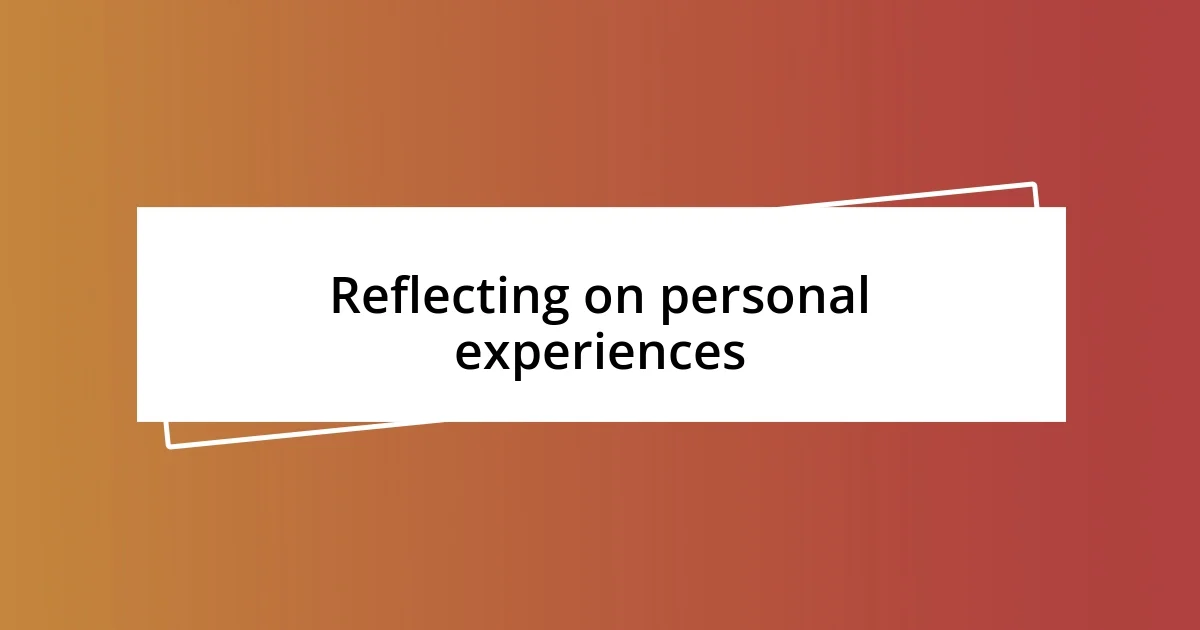
Reflecting on personal experiences
Reflecting on personal experiences has been a powerful tool for enhancing my storytelling abilities. When I take time to revisit particular moments in my life, I often find deeper meanings hidden beneath the surface. For instance, I once opened my journal to write about a tough breakup I had gone through. As I poured my heart out, the tears flowed alongside the ink, and I realized that nostalgia and heartache can add layers of complexity to character emotions. Isn’t it fascinating how real feelings can enrich fictional narratives?
I also discovered that reflecting on smaller, everyday encounters can spark creative revelations. There was this time I sat in a café and decided to journal about the people around me. Watching the interactions—the laughter, the quiet glances, the shared moments made me think about how I might capture those subtleties in my writing. By interpreting life through observation, it’s like nurturing a garden of stories right at my fingertips. Have you ever noticed how the seemingly mundane can be the most inspiring?
Through journaling, I have become more aware of my thought patterns and reactions to events. Reflecting on a frustrating incident at work helped me articulate my emotions and think critically about my response. That evening, I wrote about how it felt to be overwhelmed, yet empowered as I stood up for myself. Those reflections not only improved my personal insights but also provided me with authentic content to weave into my narratives. In what ways do we often neglect our own stories, even while seeking inspiration elsewhere?

Developing characters through journaling
Developing characters through journaling has become one of my favorite aspects of the craft. One day, I decided to flesh out a character named Clara, who was a recent graduate afraid of the real world. As I sat with my journal, I immersed myself in her thoughts, wondering what she felt as she stepped onto the bustling streets filled with opportunities and uncertainties. Through this imaginative play, I managed to find a voice for Clara that felt authentic and relatable, allowing me to weave her struggles into a compelling narrative. Can you sense how grounding a character in real emotions can make their journey resonate more deeply with readers?
Another powerful technique I’ve embraced is creating backstories for my characters. I once wrote about Tom, a shy librarian with a secret passion for punk music. In my journaling session, I explored the contrast between his reserved demeanor and the vibrant world he yearned to participate in. What came to me was not just a tale of a character but an opportunity to reflect on my own moments of feeling stuck in the shadows. I realized that by infusing my life experiences into Tom’s story, I could better express his internal battles and triumphs. Who doesn’t connect with the idea of longing for something just out of reach?
Journaling has also encouraged me to experiment with dialogue. I remember once writing a conversation between Clara and her friend over coffee, both discussing their future dreams. As I scribbled down their exchange, I realized the rhythm of their dialogue mimicked how I spoke with my own friends. This practice not only polished my skill in crafting realistic conversations but also helped me recognize how humor or vulnerability can deepen character relationships. So, how often do we overlook the power of our own conversations in shaping the stories we want to tell?
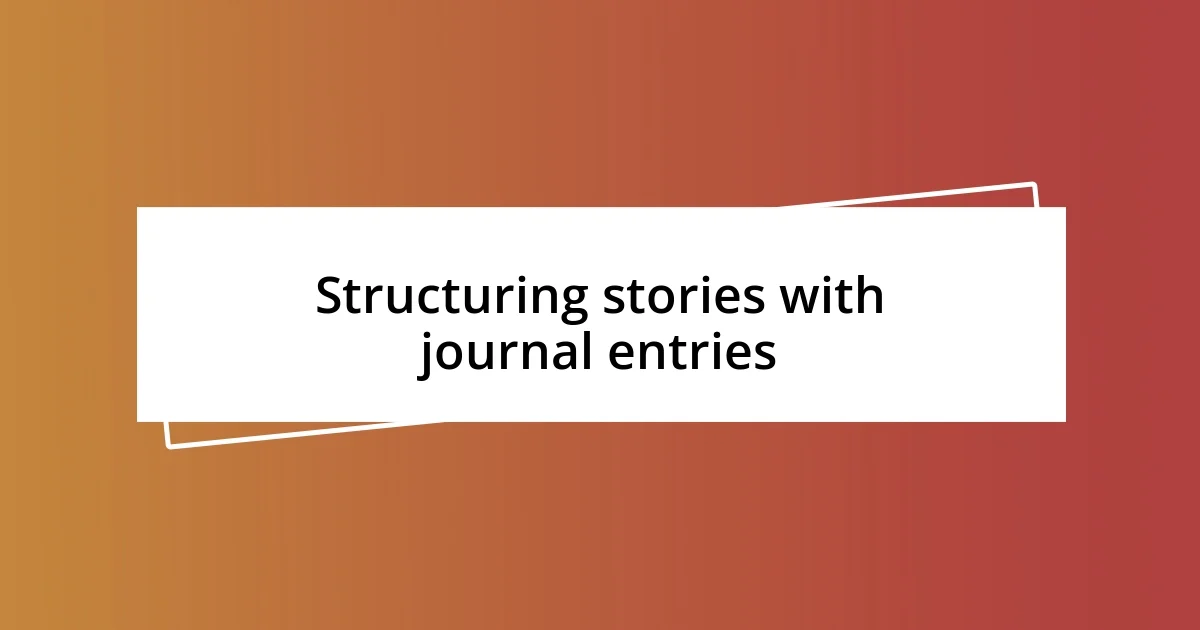
Structuring stories with journal entries
Structuring stories through journal entries has transformed how I approach narrative building. I recall a day when I sat down to dissect a thrilling hiking adventure I recently completed. As I wrote, I consciously broke the experience into key moments—the exhilaration of reaching the summit, the unexpected downpour, and the quiet reflection at the top. This method not only helped me recall vivid details but also shaped a compelling storyline with a clear arc.
Sometimes, I find that using journal entries as a framework allows me to explore multiple perspectives within a single event. For example, I once wrote about a family gathering from both my viewpoint and that of a sibling’s. By alternating between our contrasting experiences, I was able to capture the depth of emotions involved—joy, frustration, and nostalgia. Isn’t it intriguing how different lenses can transform the essence of a shared moment?
Moreover, I’ve learned the value of adding sensory details to enhance my narratives. While journaling about a visit to a local farmer’s market, I focused on the vibrant colors of the produce, the scent of fresh herbs, and the sounds of laughter. By structuring these sensory inputs into my story, I created a vivid backdrop that enriched the reader’s experience. Have you ever thought about how the smallest details can breathe life into a story, making it much more immersive?

Tips for consistent journaling practice
One of the best tips for maintaining a consistent journaling practice is to set aside a dedicated time each day. I found that scheduling my journaling during my morning coffee made the activity feel like a refreshing ritual rather than a chore. How about you? Do you have a specific moment of your day that you can carve out for this?
Another helpful strategy is to keep your journal accessible. I usually tuck mine in my bag or next to my favorite reading spot, allowing me to jot down my thoughts whenever inspiration strikes. Once, while waiting for an appointment, I quickly filled a page with observations about the people around me. Those unexpected moments of creativity can lead to wonderfully rich entries!
Lastly, don’t be afraid to embrace imperfection. Early in my journaling journey, I often cringed at my messy handwriting or lack of coherence in my thoughts. I realized that each entry, no matter how rough, is a step forward in honing my skills. Are you willing to let go of perfection and just let your thoughts flow freely? Trust me, you might be surprised by where your pen takes you!














